According to a new report by the department’s internal watchdog, the Trump Justice Department secretly collected the phone and text message logs of 43 congressional staffers and two members of Congress in 2017 and 2018 in an effort to look into classified information leaks. This was a much more extensive investigation than was previously known.
The DOJ did not act with political intent, according to Inspector General Michael Horowitz’s report, but it did not adequately consider the constitutional separation of powers when it seized the communications records of lawmakers and staffers and subjected them to criminal investigations solely because their employment permitted them to access state secrets.
Using subpoenas and other legal procedures, prosecutors were able to get the records from third-party suppliers, such as Apple, and attached gag orders to stop the businesses from informing the customers. Although the seizures had already been disclosed, the IG provided fresh information regarding the effort’s wide-ranging extent.
Separately, the Justice Department broke its own rules when it surreptitiously collected phone and text information from reporters involved in the same leak probes, which were connected to the FBI’s investigation into possible Trump campaign collaboration with Russia, according to the IG report that was made public on Tuesday.
The Biden Justice Department strengthened its rules on the matter, which had been revised in 2014 and 2015 following earlier disclosures of covert seizures of news media records, in response to the previously reported seizures of the records of reporters from The New York Times, The Washington Post, and CNN.
A committee established to examine any such actions was not consulted, despite the fact that then-Attorney General Bill Barr personally approved the news media subpoenas in 2020, according to the report. This was against policy. The report also stated that Barr refused to participate with the IG investigation.
According to the inspector general’s summary, we were concerned that these failures happened just a few years following this redesign.
Phone and message logs demonstrating who was speaking to whom were among the documents retrieved; however, the content of the conversations was not disclosed.
Two California Democrats already admitted that they were the subject of the documents seizures: Rep. Eric Swalwell, a member of the House Intelligence Committee, and Sen. Adam Schiff, the former head of the committee.
Amid requests from some of his advisors to circumvent the Justice Department’s customary separation from the president, the IG report is released as President-elect Donald Trump gets ready to assume office.
No criminal charges were brought as a result of the leak investigations. Some of the alleged offenses have a 10-year statute of limitations, so the incoming administration may decide to restart them.
Kash Patel, the man Trump claims he wants to lead the FBI, has made a clear commitment to target journalists. According to a lawsuit he filed, Patel was one of the congressional staffers whose data were confiscated during the leak inquiry.
The Trump administration could easily revoke the Justice Department’s new regulation that requires officials to alert a news organization if they decide to demand reporter phone records, unless there is an emergency.
According to the IG report, the Department’s decision to retrieve congressional staffers’ and members’ non-content communications records in media leak investigations implicated the constitutional rights and powers of a co-equal branch of government and ran the risk of limiting Congress’s ability to oversee the executive branch.
Sen. Ron Wyden, a Democrat from Oregon, called the report’s findings “beyond disturbing.”
“As these abuses demonstrate, there are few guardrails preventing a lone prosecutor or the Attorney General, the Department of Justice or even state or local law enforcement from spying on Congress and threatening our constitutional system of checks and balances,” Wyden stated in a press release. “It is particularly concerning that the Department of Justice hoodwinked a judge into signing off on secret surveillance on both Democrats and Republicans in Congress.”
Note: Every piece of content is rigorously reviewed by our team of experienced writers and editors to ensure its accuracy. Our writers use credible sources and adhere to strict fact-checking protocols to verify all claims and data before publication. If an error is identified, we promptly correct it and strive for transparency in all updates, feel free to reach out to us via email. We appreciate your trust and support!

